Jina Dharma
This blog takes you to the depths of Jainism, what is it all about; what it philosophies... It tells you everything about it that I am acquainted with. Jainism has answers to every question, yes! This may not interest my friends but I will definitely be elated if it comes to use to any of my readers.
Friday, July 2
Love and Hate (raag aur dvesh)
These are the two kinds of 'mohneey' bonds (मोहनीय कर्म) that are most dangerous to our souls...
Love (राग) means the love you harbour for your family, friends and relatives, etc. but not necessarily animate, it also means your attachment to inanimate objects such as your new cellphone perhaps or the watch your father bought you on your 12th birthday. This love does nothing but draws your attention and focus to more towards outside (the worldly things) and less towards inside (your soul). And as such, is gets your soul tied with more karmas...
Hatred (द्वेष) is the negative emotion you harbour towards anybody, like the boy who beat you up in school today, or the iron where you burnt your hands yesterday. Your hatred is similar to your love in that it draws you away from inside.
Though it might be easier thinking that hatred is harmful for your souls, it is more diificult to think that love is too. And let me tell you, it is a bigger one, much bigger...
Love and hatred are two types of bonds. Of these, the bond of love is more fierce. Hatred is like an incoming bullet, you can see it, but love is like a hidden bomb; it is invisible, and even then, seems nice, and that is why, is more dangerous. Comparatively, its easier to remove hatred from one's life than it is to remove love. Most people live off their lives loving others and being loved.
Please note that here I do not imply the absence of love as hatred. When I say, the love towards your family, I do not mean that you should hate them. The ultimate feeling of 'samta' is the absence of both love and hatred, where you treat every living being in your life as another soul, with no love or hatred towards them whatsoever. That's why you should not discriminate on the basis of race, sex, color, etc. ever because all those people are souls just like you.
Allow me to illustrate a little more. A bee sits on a lotus and sucks on its delicious juices (nectar) to satisfy its senses. This bee 'loves' the nectar. The day goes by... as sunset draws near, the lotus slowly closes itself. The bee thinks... just one more sip, and then I'll fly away, just one more sip, just one more, just one.... And ultimately, due its love towards the nectar, gets itself entrapped in the lotus. Though it can make a hole through even wood, but it cannot make a hole through the lotus to come outside, because it loves the lotus, and it loves its juices. In the meantime, an elephant comes, plucks the lotus and eats it. Due to the fierce bond of love, the bee gets killed. Similarly, you are loving the worldly things, the things outside, getting yourself more and more attached to this world. Even if the bond is relatively weak first, you increase this bond of love over time so much, that it becomes too strong to come out of.
Another example... Daas loses his 20 year old son. The parents are heartbroken and crying out. This guy Bheem comes to sympathise.... "What are you doing Daas? You are an intelligent guy. Whoever takes birth has to die someday. Everyone is a passenger in this world, whosoever's station has come will have to get down. To cry over it is not advisable. A soul never dies. It is immortal. You could not have saved your son, so why cry? "
I hope this post was not too radical to you. After all, it is the truth, said by the ominscient tirthankaras. Please don't hate me... :-)
Friday, April 18
Living Happily
Let me cite a few examples... An adult feels unsatisfied if his own son doesnt bid him "नमस्ते", because he expects him to. He won't feel anything if his neighbour's son doesnt wish him, because he doesnt expect him to. An intelligent student feels sad if he/she can't make it to his goal of 90%, while a weak student never feels sad on seeing his results. He didn't expect to score anything high. Some deep thoughts on this topic will help you realize that you can relate any of your sorrows to this. One feels sad when his father or mother scolds him, because he never expects this. He always expects them to appreciate him. These are very small scale examples. Just try and you'll believe...
To lead live happily, one has to try to stop expecting... You'll feel that it's like one of the most tough jobs. My reply to that would be, "Aye! Did you think you'll get away from sorrows so easily? " I agree that to not expect anything from your acquaintances and this world is near to impossible (This is the ultimate feeling of samta). But we can try to expect less, and then our sorrows are bound to lessen.Whenever you feel sad, or pained, just think of those who are more unhappy than you; who face more difficulties in their lives. If you feel sad about the fact that you couldnt make it to a particular college, you wanted so badly; think about millions of those who can't even think of college or those who go to a poorer college. (Try this; this actually works... Please just try it once.) Human tendency is somewhat opposite. If we don't have enough money for some of our needs (this is the case with even the richest people on earth; our need grows with the money in our hand), we tend to think of the people richer than us. We think, "Oh this guy has a Merc, while I just have a Maruti 800". We don't think that millions of people don't even possess a two-wheeler. Think that you are lucky that you've got what you've got; and just think how your life would have been worse if you were them. One thing I would mention here is that money can never ever bring you happiness. Your desires will grow with the money you have. Magnanimous people have always been there in every era of the earth but there was not one era when poverty vanished.
Sunday, September 16
Samvatsari
Paryusahan are the days to introspect, to talk to your soul.
हम पर्युशन के दिनों में तपस्या करते हैं, सामायिक करते हैं। इतना धर्म कमाने और पाप कर्म काटने कि कोशिश करते हैं, जितना सम्पूर्ण वर्ष में नहीं किया. तपस्या? जैसे एकासना, आयाम्बिल, दिन शिपने से पहले भोजन करना, उपवास, बेला, तेला, चोला, पंचोला, अठाई, etc.
एकासना: पुरे दिन में एक बार एक आसान पर बैठके खाना।
उपवास: व्रत, पूरे दिन में केवल उबला हुआ पानी (दिन शिपने से पहले ही) ही लेना।
बेला: दो दिनों का व्रत
तेला: तीन दिनों का व्रत
चोला, पंचोला, अठाई: ४, ५, ८ दिनों का व्रत (4, 5, 8 respectively)
यही नहीं बहुत और तरीक़े भी हैं तपस्या के, एक साधू ने तो १२ महीनो का व्रत किया था...! प्रतिदिन प्रतिक्रमण किया जाता है (गुरुं को नमस्कार और सभी जीवों से भी ग़लती के लिए माफ़ी माँगना)।
Samvatsari, the most sacred day of the year, is just the icing on the cake.
One of the most happening things about Samvatsari is that we ask for forgiveness for our mistakes, whether intended or done by mistake, from whom? Well, from practically everyone, everyone you know, everyone you don't know, anyone you have met till now, , every animal, every organism on this earth and beyond... any organism in the whole universe. Well, we left out on the fourth dimension. Anyone you ever seen or met even in your previous incarnations. It is a very good time to make up with anyone you have not been in good relations with. Forgiveness is one thing which can make any happy man cry and any poignant man smile. Asking for forgiveness: the key phrase is "खमत खामना" (khamatkhamana). Some also call it "खिमत खामना"
अगर मैंने इस जन्म में, पूर्व जन्मों में किसी भी जीव, देवता या किसी भी आत्मा को जानते अजानते दुःख पहुंचाया हो, तो मैं माफ़ी माँगता हूँ। खमत खामना
Finally, I ask for forgiveness from my readers of any mistake I ever made which hurt or did not hurt you. Happy Samvatsari.
सामायिक क्या है? कुछ इंतज़ार करें।
Saturday, March 31
महावीर जयंती / Mahavir Jayanti
He was to be born to Rishabhdatt (ऋषभदत्त ब्राह्मण) and Devananda (देवानंदा ब्राह्मणी), i.e. he came into her womb. But they were very poor and due to convention, all to-be tirthankaras (तिर्थंकर) are born in very rich families. So, the god indra (इंद्र) exchanged the souls in the wombs of Devananda and the queen Trishla (त्रिशला). Thus, he was born to the king Siddhartha (सिद्धार्थ) and the queen trishla (त्रिशला). He was originally named 'vardhmaan' (वर्द्धमान) due to the profit in trade and other aspects in the kingdom of Vaishali (वैशाली) on his birth. He was born in Kundalapur (कुन्दलपुर).
He was very brave, even in his childhood, very characteristic of a tirthankar. Once while playing with his friends, they saw a snake which was drawing near them. Everyone began to ran away in fear save one, yes, mahavir swami. And due to this act of bravery by him, he was named 'Vir' (वीर). And due to his more such acts, he was eventually named 'Mahavir' (महावीर). He had an elder brother 'Nandivardhan' (नन्दीवर्धन) and a younger sister 'Sudarshana' (सुदर्शना). He was married to Yashoda (यशोदा) and had a daughter 'Priyadarshana' (प्रियदर्शना). Priyadarshana was eventually married to Jamaali (जमाली).
He wanted to take diksha at the age of 28, when his parents died. [This amounts to me telling you another anecdote. When he was in the womb of Trishla, he delibrately stopped moving so as to reduce the pain mother Trishla was feeling due to his movement. But when movement stopped, she even grew more troubled and worried. And then, Mahavir prabhu started his movements again, such was his greatness!!. And then, he vowed that he won't take diksha until his parents die, so that they do not feel pained.] But his brother nandivardhan stopped him, saying that he should atleast stay 2 years more with him. So, mahavir swami took diksha at the age of 30.
He got niravana (moksha ->मोक्ष) at the age of 72. Do you know, he gave deshna (i.e. व्याख्यान) for consecutively 3 days before getting nirvana.
Dont despair, more will be posted on this great soul in due time.
Monday, February 26
Monday, February 19
Logass ka paath




have established the dharma-thirtha,
I praise the Arihantas
the twenty four kevalis.
I worship Rushabha and Ajita,
Sambhava, Abhinanda and Sumati,
Padmaprabha, Suparshva,
I worship the Chandraprabha Jina.
Suvidhi or pushpadanta,
Shitala, Shreyansa and Vasapujya,
Vimala and Ananta Jina,
I worship Dharma and Shanti.
Kunthu, Ara and Malli,
I worship Muni-Suvrata and Nami Jina,
I worship Arishtanemi,
Parshva and Vardhman.
These who I praise,
without the dirt of Karma, beyond old age and death,
the 24 Jinas,
may Tirthankaras bless me.
Those who I praise and worship,
noble Siddhas in the world,
freedom from disease, possession of wisdoms
give me the noble blessing of Samadhi.
Cleaner than the moons
Brighter than the Suns,
deeper than ocean,
the Siddhas may bless me with Siddhi.
Saturday, February 3
ONE SHORT EYE-OPENER
Picture a blind man in a very large room. The room has just one small door. The blind man wants to get out of the room but doesn't know where is the door. After much futile labour, he devised a plan. He went near the wall and put a hand on the wall. He thought that he would move along the wall and get to the door finally, whether it be after a long time. He walked. An hour passed by but didn't reach the door yet (the room is so large). And then when he was just about to reach the door, his knee began to itch so painfully that he had to remove his hand from the wall and rub his knee with both his hands very vigorously. He passed by the door but didn't get to know about it. And then he put his hand on the wall...
Don't you feel magananimous or pathetic about that poor blind man? Well, first think about yourself.
The blind man is our soul, and the laaaaaarge room is this damn vast universe, where our soul resides, and roams continuously searching for that one Door.......moksha, yes, moksha.
It is highly unlikely that a soul (after the end of its one life) is reborn in manushya gati. Statistically, the probability approaches zero. And then, even if one gets this gati, it is far more unlikely that one gets 'dharma'. Do you know that in some parts of the world, there are people who eat other people. The actually devour babies and even children. You might be knowing about the Chinese who eat anything, absolutely anything. Why? because of the simple reason that there is absence of 'dharma', i.e. enlightenment or true awareness of what's right and what's wrong, about where we have come from and where do we have to go.
So consider yourself very lucky that you are a human, and yet a few times luckier that you are reading this, and knowing what dharma is.
Moksha is not a particular place where we have to go, rather it is a state of our soul, a permanent one. As our bondage with this strange world lessens, our soul moves towards moksha, its ultimate destination or better its ultimate state.
Thursday, February 1
Ahimsa
Ahimsa has many meanings, not just not killing or harming others, but many. First of all, if you are a non-vegetarian, you cannot be practising ahimsa. Non-veg itself comes from killing animals. Ahimsa means that you don't have to do any such work which directly or indirectly is causing killing of innocent living organisms. Ahimsa tells you to feel for others. It is to not harm others yourself and stop others from doing it.
Here are some examples which are not related with 'hinsa' at all, but are. Wearing leather belts or shoes or using leather in any form is hinsa, YOU are liable for the animals killed for the leather with which those were made. And if it is that damn necessary (e.g. for wallets), use resin instead, i.e. things made of resin, they work the same. Now, wearing silk is yet another form of hinsa. Why? Because, just to make 1 m of silk, about 500 silkworms are boiled to death. It is most barbarous of acts to kill so many organisms for just style when you have alternatives as synthetic silk, or cotton, or many more. Now, as already mentioned in my previous posts, even thinking about killing other organisms is hinsa. Buying a chewing gum, even if you dont eat it is hinsa since it contains gelatin, obtaining which involves killing. You know, even seeing violence in movies and serials involves hinsa, since somewhere in your mind, while the hero is killing the villain, there exists a feeling "go kill him" and here the hinsa comes in. And then, these are the examples of hinsa which are unavoidable. When you walk, you kill the 'sthavar' organisms below your feet in the floor. When you speak, the microbes in the air in front of your mouth are killed. (this can be avoided by keeping your hand in front of your mouth or 'mukhpatti' while speaking as you would have seen the jain sadhus, but isnt practical for us). When you eat, you are being the cause of killing as cooking the food kills the microbes in the food. And even when you excrete or urinate, it involves hinsa. You switch on the light in your room or use any electrical appliance, you are doing hinsa as electricity kills 'jeevs'. There are many more.
Now, recall; Recall everything you do in routine. There are numerous incidents or works done by us which causes hinsa. But many of them are impractical to prevent. SO, I appeal to all of you to atleast abandon those reasons of hinsa which can be left, to clean your soul from all sins. eg. try not to eat non-veg and avoid leather shoes.
You might know ahimsa as one of the basic principles of Gandhi, but do you know where he got it from, our 24th tirthankara 'mahavira'. His thinking were radically affected by the teachings of 'mahavira'. If you are a pure ahinsak, ahimsa alone can lay your path to moksha.
Monday, January 8
The five 'species'

Here are the details:
1. ekendriya: These are the organisms with only one sense. eg many microbes
2. dvindriya: 2 senses
3. trindriya: 3 senses
4. chaturindriya: 4 senses
5. panchendriya: 5 senses, eg humans, dogs, crow, etc.
The significance of the classification can be illustrated with this example: The classification tells us the comparative 'importance' of the living organisms, i.e. the ekendriya organisms are underpriviledged to the dvindriya and so on... Now, suppose, by mistake you killed a trindriya organism, so you get less 'karmas' tied with your soul as compared to when you kill a chaturindriya organism. Note, a soul can shift its mortal body from ekendriya to panchendriya, even, through good deeds. If even an animal thinks good or does good, (has enough good deeds), he can even become a human being in his upcoming births. And we, the humans, if do evil deeds, can even go to the ekendriyta jaati.
Here's a real story: There was a jungle. Once there was a forest fire in the jungle. All the animals ran and gathered in a small piece of ground, where fire was ineffective. There was an elephant among those. He suddenly felt some itching and to relieve it, lifted one f his legs, and history has it, that a small rabbit came running into the smaller piece of land where the elephant had his leg. Then, as the elephant began keeping his leg back on ground, he saw the rabbit, and so high feelings of magnamity aroused in him, that he kept his leg lifted, though it was very difficult. But he did not even think about killing the rabbit. Months passed by... After the fire was extinguished due to the rains, every animal ran back away into the jungle. The elephant began keeping his leg on the ground, and damn, couldnt move it. He fell, and died there, and then, was reborn in heaven.
So you see?
I once again request my readers to keep 'samta'.
Wednesday, December 20
Are feelings/thoughts important?
Allow me illustrate you this with an example or two... Say, someone (mistakenly or intentionally) hits you or abuses you, you might not say anything to him/her ('samta') bt still you most probably will think evil for him, or just feel that you must take avenge it, or such things. This immediately gets your soul tied with more 'karmas'. This is a very small scale example. Consider this.. You worked all day hard on your assignment, and someone spilled water on it, or tore it, or misplaced it, or whatever. The instantaneous reaction is "idiot", "stupid", what did you do? and then you go on cursing the person. You should not even think about it.
Feelings should be correct not only towards other humans but animals too. You should not even think about killing or harming other living beings. Even thinking about gets you as much 'paap' as doing it. , such as... you might think on some occassion for whatever reasons you may have 'might god kill him' or 'may he be damned' snd such things. this is a very hideous crime according to Jainism. You are doing as much wrong as killing the person itself. that's why I said 'Feelings are damn important'. You must acknowledge this fact that you must prioritise 'good for all' before 'good for me'. And good thinking increases our good fortune.
here is a story... There was a king who strongly believed in 'ahimsa'. He was strictly against harming or killing others for his benefits. But due to some 'karmas' in his previous births, he was suffering from misfortune. He consulted his 'raajpandits' who were superstitious, and told the king to kill a hen to remove misfortune. he denied unthinkingly. But his mother begged her, and he couldn't deny her. That's why he thought of a way, he told his mother, that they could just make a statue of hen with flour ('aatta') and use it in yagya. Everyone agreed (or had to agree). BUT during the yagya, the king was thinking that they are giving a real hen as 'bali'. This thought, just this feeling, that he was killing a real hen resulted in his going to hell, and he got tied as much karma with his soul as it would have if it was really carried out.
So, you see?? Your thoughts are vital to your future and sometimes(most of the times) more important than your actions, since you think more than you do. So, what's the remedy if a hideous thought crosses our mind, and we cannot control it? Just be true to yourself and with real emotions and a real heart, ask for forgiveness for your soul, i.e. say 'tassa mischchami dukkadam'. (This is Jainism way of asking for forgiveness).
Therefore, I appeal to all my readers to groom their actions and thoughts as well, and always harbour good feelings towards others, whatever discomfort they give to you.
Tuesday, December 5
SAMTA- the ultimate feeling
'Samta' means the feeling of sambhaav, i.e. to harbour the same feeling for all and at all times, and that too not of hatred or love, well, actually, it is inexplicable as a feeling. You do not have to be happy when it is time to celebrate for that shows your 'moh' to worldly things; and at the same time you do not have to be sad and cry your heart out whenever life's not fair.
Samta includes not to be happy when it is time to be, just think why you are getting this happiness? because of your unearthly deeds in your previous births that you are born as a human this time; to not to be sad when you do not have the circumstances in accord to you; to not to be arrogant about what you have got, which is worth showing off in this world, be it money (like the rich look upon the poor), or status, or fair colour of skin, or may be some exceptionally good qualities (be it academic or otherwise)--remember friends, if you have some coveted quality, say intelligence, it is because of the very fact that you have done really good deeds in the past such as meditation on soul, and that's why you have that power of intelligence in you, don't waste away this quality and get the 'bandh' of more karmas by showing off or boasting or being arrogant about it, ; to bear any atrocities on you be it to any degree or extent-Bhagwaan mahavir swami didnt even say 'ouch' or even a small lineof worry cross his forehead when a gwala had knocked 2 screws into his 2 ears; and much more...
The tirthankaras had an unusual incredible samta.
'Samta' is aptly the ultimate feeling. If one keeps samta, (the feeling of 'sambhaav') in his life at every crossroad or so, he is bound to make his way to 'moksha' easier.
On this note, let me relate a story which is worthy of mention. There was a group of sadhu. On the day of samvasri (will be elaborated upon in later posts), when even common ppl keep a fast, one sadhu urged on not keeping it, since he did not feel he would be able to keep it. He went fro bhiksha to take food from the household. When he came back, he showed what he had brought to the acharya(every group has a head 'acharya') -it was 'khichdi'. The acharya was angry since on such an auspicious day, a sadhu of his group did not keep a fast. (anger is a feeling to be deserted). Anyways, so the acharya spat on the khichdi. Here consider yourself in the state of the sadhu, wouldnt you have been double angry and rebuked (and that's how wars or quarrels begin), but the sadhu, kept samta, that is, he felt no emotion at that point of time, not even for an instance, did anger cross his mind.
And this was the most unearthly thing of all... He instantly got the 'keval gyaan' (will be elaborated in next posta), and he went to moksha,the ultimate deestination for soul.
Note: a soul who gets kevala gyaan is destined to go to moksha.
so you see, how very important 'samta' is to cross this world of ups and downs, of good and bad, of love and treachery or enmity, to settle in the peaceful of all places in universe and beyond... moksha.
Saturday, November 18
The 'TIRTHANKARAS'
Jainism now acknowledges 24 gods or, better called tirthankaras
in the Namokar mahamantra, (1st post of October) we bow to the siddhas in the second line
Well, all the tirthankaras are siddha , though there are many more
Anyways, we had divided time into 2 parts- 'avasarpani' and 'utsarpani'
Every such part has 24 tirthankaras, i.e. there are 24 tirthankaras in every passage from 1st aara to the 6th or from the 6th to the 1st. These are the pure souls who were able to burn all their 'karmas' through samta, tap, jap, etc. And they now rest in 'moksha'.
So here are the 24 tirthankaras which were in this avasarpani kaal:
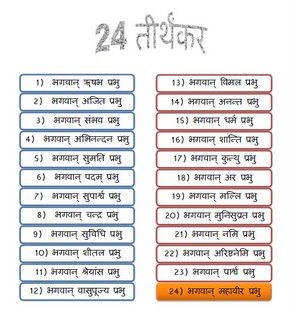
Note: at present the shasan of 24th tirthankar 'mahaavir' prabhu is going on, i.e. he was the last one.
So, we Jains worship them.
Tirthankaras are Jain gods. They when lived, lived ideally. They kept samta. They gave away worldly happiness (left the 'moh') and concentrated in their souls. They gave "gyaan" to all the common people about things not known to anyone. They had 'keval gyaan' i.e. they knew everything ('antaryami'). More will be elaborated upon the types of 'gyaan'. They were an epitome of kindness, benevolence, mercy. They never used to fight or even get angry, always looked to the other person's happiness, controlled their ambitions, lived a 'saadhu life'. They never took to live like a housefold. So they had to ask for food goin from home to home. Also they used to migrate from one place to another. They are the ideal persons in Jainism. Their 'vaani' used to have a deep effect on all people, and they always used to enourage others to take 'deeksha'.
Here's some interesting stuff. As you know, utsarpani kaal will follow the ongoing the avasarpani kaal. And we all know the great hindu god "Krishna". According to Jainism, he was a 'vasudeva' (more will be told afterwards), and his soul is in hell right now; our tirthankaras have predicted (they know everything, so, it's got to be true) that he will ve a 'tirthankara' in the next utsarpani kaal. Lucky soul, its getting moksha, the next time it comes to earth.
One piece of secret, My real name is the same as our third tirthankara, i.e. I am Sambhav Jain
Wednesday, November 15
TIME (classification)
here's yet another post...
According to Jainism or Jina Dharma, we classify time (kaal) into 2 parts:
1. avsarpani kaal, and
2. utsarpani kaal
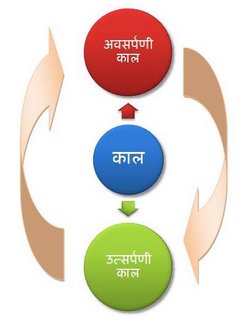
So, what happens is:
This world is beginning-less and endless, that is, it has no beginning and will have no end, more interesting posts on this topic will soon be coming
The 'avsarpani' and 'utsarpani' kaal alternate each other. So what are these are avsarpani and utsarpani?
So allow me to show you the detailed classification of time into what we call as 'aare':
1. Sukhad-sukhad (or Sukhma-sukhma) : This is the best. Noone has no worry, never. Everyone who is born in this time is happy, and why not we have the "kalpavriksha" and the "kamadhenu", who fulfill all wishes of all. (Yes! they are a reality)
2. Sukhad (or Sukhma): This is the second best. Almost similar to the first; everyone is happy here too, though not as much as 1st
3. Sukhad-dukhad (or Sukhma-dukhma): You get the sequence, don't you? So this comes next
4. Dukhad-sukhad (or Dukhma-sukhma): This is next
5. Dukhad (or Dukhma): No need to repeat same thing again and again. Here noone is happy, everyone has some worry or the other
6. Dukhad-dukhad (or Dukhma-dukhma): Worst; earth is burning, humans live beneath the earth, get out only at night and eat only non-veg. Vegetation disappears.
NOTE: the 'tirthankaras' only exist in 3rd and 4th aaras
So you might be wondering at present, which aara is going on?
Well, it is the 5th (Dukhad), this imply everyone has some worry or the other. Ask yourself, reader does no worry or anxiety trouble you; if your answer is 'NO', think again, for it is not possible.
And the time moves as follows: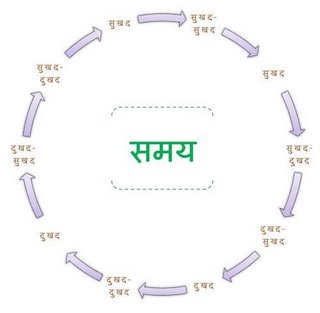
So, the the avsarpani kaal is this:
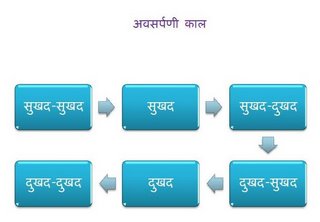
And the utsarpani kaal is this:
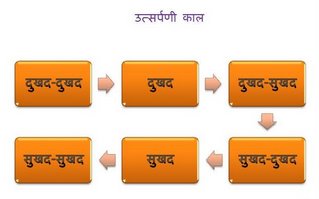
So you get the drift;
when time moves, it moves alternately as avsarpani-utsarpani-avsarpani-utsarpani----
Since the universe is beginning-less, noone can say which was the first 'avsarpani' or the 'utsarpani', not even the tirthankaras
uh! I fight off an urge to disclose more, which I do not wish to pursue at this time.
STAY TUNED!
Monday, November 6
BASIC SOUL PHILOSOPHY
Eg. All of us know of ‘Sita’, yes the one in Ramayan. The truth is that in her some previous birth, she had locked a ‘sadhu’ in a room for 14 days, and that’s why, she had to suffer a 14 years exile in her known-to-all birth. So you see, the punishment for 14 days became 14 years, i.e. many times.
There are four ‘gati’s. They are:
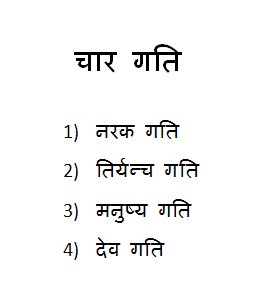
Note: tiryanch gati is the animal gati, i.e. the souls of all animals are in tiryanch gati.
So every soul takes the form of one or other gati. We presently are in ‘manushya gati’ but who knows, in future, we may take birth as a snake or land up in ‘narak’. Yes! Hell and heavens exist, and not only that, there are 12 heavens and 7 hells. The one who does evil deeds, or houses evil feelings towards anyone goes to hell (7th being the worst) and vice-versa(12th being the best). So, to stop our soul from suffering, it has to go to ‘moksha’; this is the ultimate destination of every souls, which causes rebirths to stop. So, keep ‘samta’, do good deeds and aim towards moksha. What one achieves in each life is of no consequence.
If you have any queries, please leave them as a comment to this post. Everything told above will be elaborated upon in the following posts.
Saturday, October 28
NAVAKAR MANTRA
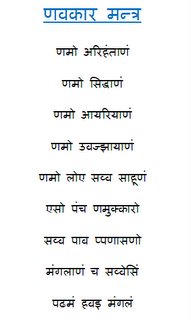
Namo Arihantanam
I bow in veneration to Arihantas (the destroyers of our inner enemies viz., Karmas).
Namo Siddhanam
I bow in veneration to Siddhas. (The souls that are perfect through the destruction of the Karmas.)
Namo Ayariyanam
I bow in veneration to Acharyas (The Head Sadhus of the four- fold Jain Sangh).
Namo Uvajjhayanam
I bow in veneration to Upadhyayas (The learned Sadhus who illustrate the Scriptures).
Namo loye savva sahunam
I bow in veneration to all Sadhus in the world. (Those who are pursuing the path of Moksha or salvation.)
Eso pancha namukkaro
Savva pävappanäsano
Mangalänam cha savvesim
Padhamam havai mangalam
This five-fold salutation destroys all sins and is the most auspicious one amongst all auspicious things.
Hereby, I appeal my readers to kindly try n learn this lil mantra, and believe me if you just say it once a day, your life will change for good. And if you wish, you will notice the change yourself. If you are kind enough to read my next posts, you will see why is it so necessary. Please follow my advice.

